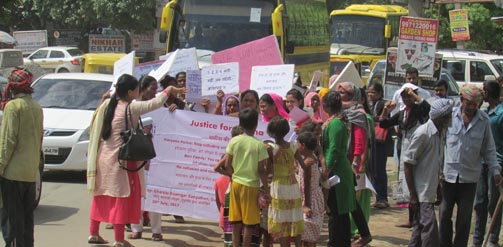We academics wish to express our anguish with regard to the recent rapes in India that have shocked the nation and the world. In Kathua, Jammu an eight year old girl belonging to the nomadic Bakerwal Muslim community was brutally gang raped and murdered, as part of an act to ‘communally cleanse’ the area of this minority group. The police and lawyers seeking justice for the girl were initially prevented from filing charge sheets by right-wing Hindu supporters, including local lawyers and two state ministers from the ruling Bhartiya Janta Party (BJP). Another recent rape of a minor in Unnao, Uttar Pradesh has also dominated the headlines. Here too state government failed to even initially register the case and most shockingly the protesting father of the victim died in judicial custody.

The recent statistics of convictions in rape cases of women and minors in India is dismal with only one in four being brought to book. Prime Minister Modi’s assurances of ‘protecting daughters’ and the girl child ring hollow as those belonging to his own party are being accused of rape. Moreover, the ruling BJP and its supporters have tended to protect alleged perpetrators instead of assuming the responsibility of protecting the basic rights of the victims. A corrupt police and a shambolic criminal justice system subject to political pressure allow powerful perpetrators to roam freely.
These two rapes are a symptom of a deeper socio-political systemic crisis in India and not isolated incidents. Under Modi’s watch, hate speech as well as hate crimes (including rapes, murders and lynching) vis-a-vis minorities such as Muslims, Christians and Dalits as well as women and children have increased. Rapes have often been used as weapons to subjugate minorities during communal riots. The secular and moral fabric of India has been undermined. The Prime Minister has usually responded with silence or weak assurances of justice.
We wonder whether these issues were adequately addressed at last week’s Commonwealth heads of state meeting, where no doubt ministerial platitudes and discussions of future economic transactions dominated.
As a reaction to the uproar in India and the world about these two cases, the Indian government has just approved the introduction of the death penalty for those who rape children. Yet it is unknown whether this will really reduce incidences of rape in the long run.
Firm assertive action to bring the perpetrators to book, including policies that implement the vitally needed police and judicial reform to enhance accountability may go some way towards securing justice for the victims. It is also important to protect the rights and interests of minorities, women and children. Individuals, especially government officials, committing hate crimes and hate speech must be swiftly prosecuted.
Professor Lyla Mehta, Institute of Development Studies
Professor Vinita Damodaran, University of Sussex
Dr Shilpi Srivastava, Institute of Development Studies
Dr Priya Deshingkar, University of Sussex
Dr Jaideep Gupte, Institute of Development Studies
Dr Anuradha Joshi, Institute of Development Studies
Dr Deepta Chopra, Institute of Development Studies
Dr Dolf te Lintelo, Institute of Development Studies
Dr Shandana Mohmand, Institute of Development Studies
Dr Lars Otto Naess, Institute of Development Studies
Dr Pauline Oosterhoff, Institute of Development Studies
Dr Amrita Saha, Institute of Development Studies
Dr Philip Mader, Institute of Development Studies
Professor Ben Rogaly, University of Sussex
Dr Kirat Randhawa
Dr Syed Abbas, Institute of Development Studies
Dr Aparna John, Institute of Development Studies
Professor Pritam Singh, Oxford Brookes University
Dr Bindi Shah, University of Southampton
Dr Saurabh Arora, University of Sussex
Dr Meena Dhanda, University of Wolverhampton
Dr Rob Byrne, University of Sussex
Professor Steve Taylor, Northumbria University
Jerker Edström, Institute of Development Studies
Dr. Pragya Srivastava, The Francis Crick Institute, London
Dr Dinah Rajak, University of Sussex
Dr Subir Sinha, SOAS
Photo: Protests against the rape and murder of a minor domestic worker in Gurgaon, India in 2017. IDWF / Flickr / (CC BY-NC-ND 2.0)